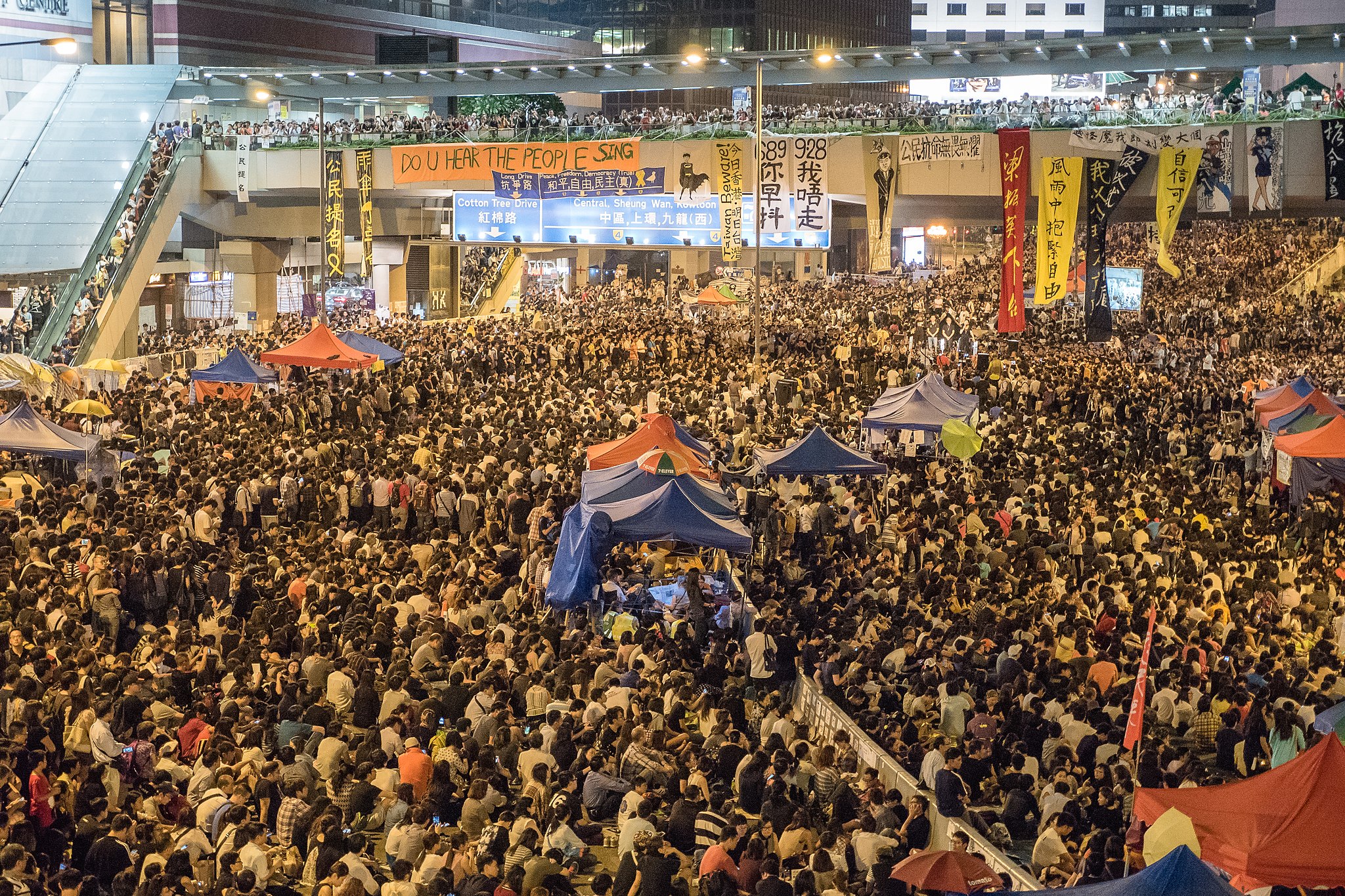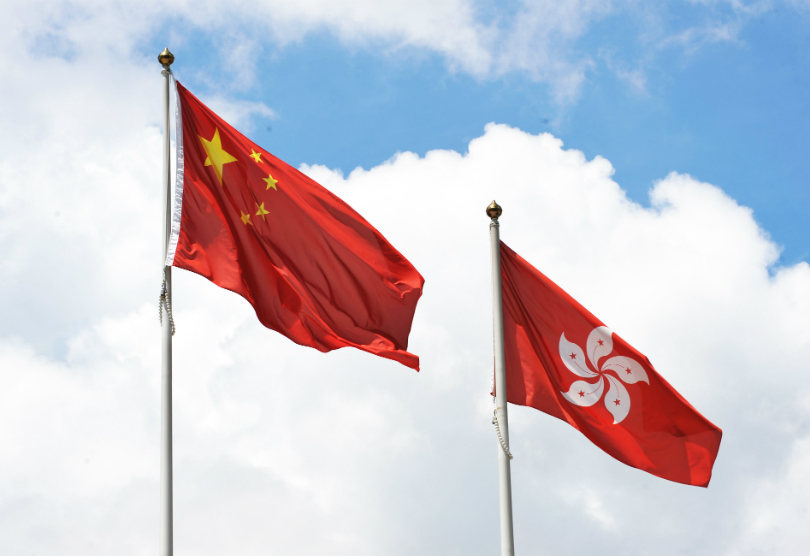September of 2014 saw Hong Kong’s gleaming central business district, one of the most important financial hubs in the world, turn into a virtual conflict zone, replete with shouting mobs, police in riot gear, and clouds of tear gas. In an atmosphere of discontent for the national government in Beijing, Hong Kongers took to the streets demanding autonomy for their island and the right to universal suffrage, dubbed the Umbrella Movement due to the use of umbrellas used to defend against police pepper spray. Since the return of the island to the Chinese in 1997, Hong Kong residents, separated by mere feet from the mainland by the Sham Chun River, believe that the central government has been slowly and systematically tightening its grip over the city, rendering its citizens politically marginalized and economically squeezed, mirroring the situation of their mainland counterparts.
As an administered region of China, a nation with a long and fractured history of clamping down on public demonstrations, Hong Kong’s act of expression in 2014 was noteworthy. But the island’s ability to freely assemble characterizes its status as a Special Administrative Region (SAR) of China. These protests legitimized a growing political consciousness for the people of Hong Kong, and their aftermath retrospectively illuminates the mainland’s growing concerns over Hong Kong’s right to self-determination.

On August 31st, 2014 — days before these protests occurred — the Beijing government, under General Secretary Xi Jinping, adopted a decision revising the nature of the 2017 Hong Kong Chief Executive elections, which formerly promised that the region would be able to freely elect its’ top leader through universal suffrage. The new decision stated that a nominating committee, chosen by the Central Communist Party in Beijing, be formed to nominate two to three candidates, each of whom must receive the support of more than half of the members of this committee. After a ‘free’ election by Hong Kong’s voters, Beijing would have final approval of a Chief Executive. Above all else though, the decision stipulated that those involved in the governing of the SAR must “love the country and love Hong Kong”. Hong Kong nationalism is Chinese nationalism, the decision asserts. With this shift towards a more united and confederated front between Hong Kong and the Mainland, the ideals of Hong Kong — at least from Beijing’s standpoint — were becoming one.
This groundbreaking policy was a major change in the Mainland’s position on Hong Kong’s autonomy, a stance explicitly entrenched in a treaty between Beijing and London in 1997. According to this treaty, Hong Kong was to be returned to China from the United Kingdom, after more than one hundred years of colonization, as a special administrative region under the principle of “one country, two systems”. An attempt by the United Kingdom to spread its Democratic ideology in a nation directly opposed to this, the territory was able to keep the Democratic values it supposedly enjoyed as a British Colony as laid out in the Hong Kong Basic Law, which states that “the socialist system and policies shall not be practised in the Hong Kong Special Administrative Region, and the previous capitalist system and way of life shall remain unchanged for 50 years.” SARs — Hong Kong and Macau — are intended to have a high degree of autonomy and enjoy executive, legislative and independent judicial power, including that of final adjudication.
This policy was seldom tinkered with until Xi Jinping took power in 2012, whose own dream of being the second-coming of Mao made Hong Kong’s democratic values a burden rather than an advantage. In 2014, just months before the Umbrella Movement, Beijing released a policy report pitching a conflict between “one country” and “two systems”, stating that the interests of China (“one country”) should prevail over Hong Kong’s constitutional autonomy (“two systems”). Secretary Xi was not hiding behind any policy justification: these decisions were explicitly meant to challenge Hong Kong’s democratic ideals.
Fast forward to 2017 and the fallout of the Umbrella Movement was still being played out. In August of that year, the two main organizers of the protests, students Nathan Law and Alex Chow, were sentenced to six to eight months’ imprisonment and banned from serving in Hong Kong politics for another five years, effectively cutting off these pro-democracy thinkers from freedom of speech in a political platform. In the intervening months, the door has been left open for the election of pro-Beijing officials, notably Carrie Lam — the current Chief Secretary of Hong Kong — who has repeatedly made clear her stance on Hong Kong’s relation to Beijing. This comes in tandem with Xi’s visit to Hong Kong in August of 2017, his first to the island since he took power in 2012. In his speech to Mainland-loyal leaders in Hong Kong, the President noted that “any attempt to endanger China’s sovereignty and security… or use Hong Kong to carry out infiltration and sabotage activities against the Mainland is an act that crosses a red line.” Freedom of assembly, a hallmark of Hong Kong’s political sovereignty, has no room in Xi’s vision for the island. By framing this issue as a danger to China’s national security, Xi seeks to build a case that Hong Kong’s autonomy hinders his goal to build a national coalition that derives unity from China’s established political institutions.
In February of this year, the Communist party in Beijing proposed removing term limits from China’s constitution, which easily passed at the National People’s Congress in March. This is only another explicit example of Xi unapologetically consolidating power within his nation, which also includes his ascension to Paramount Leader, a term only ever used to address Mao. With a President clearly unconcerned about past precedent, this crackdown on Hong Kong is understandable.
Even more than political autonomy and the democratic values enshrined in Hong Kong’s constitution, the SAR is special as a haven for freedom of thought within the highly-censored nation, with many Mainlanders traveling to the island for this explicit purpose. In this light, the altering of Hong Kong’s constitutional powers takes on a different purpose: political dissent is key to bringing down an authoritarian regime while a homogeneity of thought is key to implementing autocratic decisions. The latter has already been accomplished: Xi Jinping Thought. What is the future for the former?
Hong Kong’s autonomy has concrete implications for Xi’s political aspirations and thus, the island’s political autonomy is in serious danger within a country that has shown its indifference to bypassing tradition and law. And for a leadership already grappling with separatist movements in the western regions Tibet and Xinjiang, any sort of successful independence movement would set an unthinkable precedent. Xi’s path forward, if the past is any indication, seems quite simple. But, truly, the future of Hong Kong is unpredictable. It all depends on Xi’s perceived future for himself, of which no one can foretell.
Featured Image Source: Hong Kong Free Press






Be First to Comment